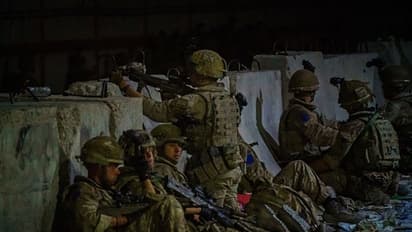Here's everything you need to know about ISIS-K which carried Kabul Airport attack

Synopsis
The term "Khorasan" refers to the ancient name for the area, including portions of Pakistan, Iran, Afghanistan, and Central Asia.
The devastation caused by twin suicide attacks at Kabul International Airport will reinforce worries that a Taliban-controlled Afghanistan would become an increasingly powerful magnet for terror groups such as ISIS. The attacks, claimed by the locally based ISIS-Khorasan or IS-K, killed hundreds of people, including 13 US soldiers, and occurred despite numerous, site-specific intelligence warnings that such an assault was likely. The military death toll was the Pentagon's most significant single-day loss in Afghanistan since 2011.
Also Read | Since 2011, Kabul airport attack worst US loss in Afghanistan
All about the ISIS-Khorasan
Months after ISIS established a caliphate in Iraq and Syria in 2014, Pakistani Taliban members joined terrorists in Afghanistan to form a regional chapter, swearing allegiance to IS leader Abu Bakr al-Baghdadi.
The organisation was formally recognised by the central ISIS leadership the following year as it established itself in northeastern Afghanistan, notably in the provinces of Kunar, Nangarhar, and Nuristan.
According to United Nations reports, it has managed to establish sleeper cells in other regions of Pakistan and Afghanistan, including Kabul. As per reports, the current estimates range from several thousand active combatants to as few as 500.
The term "Khorasan" refers to the ancient name for the area, including portions of Pakistan, Iran, Afghanistan, and Central Asia.
Also Read | Taliban denying ISIS link is like Pakistan denying Quetta Shura, says Amrullah Saleh
How is the group related to the Taliban?
While both organisations are hardcore Sunni terrorists, they are not cordial. They have disagreed on religious and strategic details while claiming to be the real flag-bearers of jihad.
That spat had resulted in brutal combat between the two, with the Taliban emerging mostly triumphant after 2019 when IS-Khorasan failed to hold territory in the same way its parent organisation did in the Middle East. In indicating the jihadist organisations' animosity, IS statements have referred to the Taliban as apostates.
About ISIS attacks
The ISIS cell in Afghanistan and Pakistan has carried out some of the worst assaults in recent years. It has killed people in both nations and mosques, shrines, public spaces, and hospitals. The organisation has attacked Muslims from heterodox groups, such as Shiites.
Also Read | Kabul terror attack toll over 90, Joe Biden vows to hunt down attackers
Last year, shooters embarked on a violent rampage at a maternity facility in Kabul's mainly Shiite neighbourhood, and the organisation was implicated. The outfit has failed to hold any territory in the region, suffering massive losses due to Taliban and US-led military operations. According to UN and US military estimates, IS-Khorasan conducts high-profile operations primarily through clandestine cells in or near cities.
Check the Breaking News Today and Latest News from across India and around the world. Stay updated with the latest World News and global developments from politics to economy and current affairs. Get in-depth coverage of China News, Europe News, Pakistan News, and South Asia News, along with top headlines from the UK and US. Follow expert analysis, international trends, and breaking updates from around the globe. Download the Asianet News Official App from the Android Play Store and iPhone App Store for accurate and timely news updates anytime, anywhere.